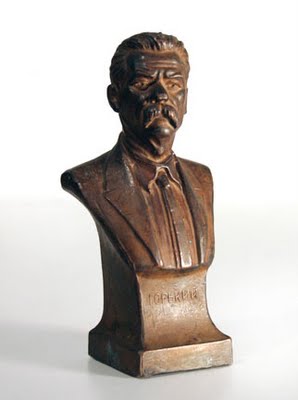The Bust of Gold

As long as I could remember, this small bronze bust of famous Russian writer Maxim Gorky stood in my grandmother’s cupboard, among the tea sets, crystal, and other so-called family treasures. Even in my childhood, something did not seem right about this object. Why did our Jewish family keep this portrait of the most official and little-loved Russian classic? Why would my kind grandma always firmly say: “Put it back!” when I reached for the sculpture, on rare occasions when I was permitted to handle the contents of her cupboard?
Many years passed before I found out, quite by chance, a strange story of our bust.
By the late 1920s, the victorious Soviet power has declared war on its own citizens. One of the acts was a decree of confiscation of all people’s gold and jewels. Non-compliance could mean arrest, seizure of all property, and deportation to the newly established system of labor camps, the notorious Gulag.
My grandparents, of course, had a bit of savings, converted into gold coins so that it could survive inflation. They euphemistically referred to it as “something for a rainy day”. Keeping one’s own gold rather than surrendering it to the State, was not a matter of greed. Rather, it was an act of human dignity; perhaps, even an attempt at civil disobedience. They decided to sew the gold hoard into a mattress, where it laid untouched for the next twenty years.
By 1948, in the aftermath of the World War II, the aging and increasingly paranoid Stalin had initiated a statewide anti-Semitic campaign. Rumors were abound about the imminent roundup of all Jews for a forced resettlement far in the Eastern Siberia. In the face of these new dangers, our family gold in the mattress was no longer safe. It seemed unlikely that mattresses would be allowed to be taken along into the exile. My grandparents looked for a less conspicuous and more portable safe.
I do not think they saw any irony in picking the bust of Stalin’s favorite writer for hiding their coins. If anything, this seemed like an extra safety measure. They sealed the gold inside the sculpture with candle wax, where it laid hidden for another forty years, outliving the Soviet Union itself. The rainy day never came. In the 1990s, when possession of gold became a virtue rather than a crime, my mother melted the wax and released the coins, which were divided among the family.
Determined to bring this unusual souvenir back to New York, I was going through Moscow airport security when a customs official noticed a strange item in my suitcase. “It’s just a family thing, nothing valuable”, I showed him the empty bust. “Strange,” he said, “on our screens here it shows like gold”. I only smiled. The aura of gold was still there, detectable by their fancy sensors, yet the treasure itself had turned into memory, something that no State power could ever take away.

